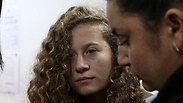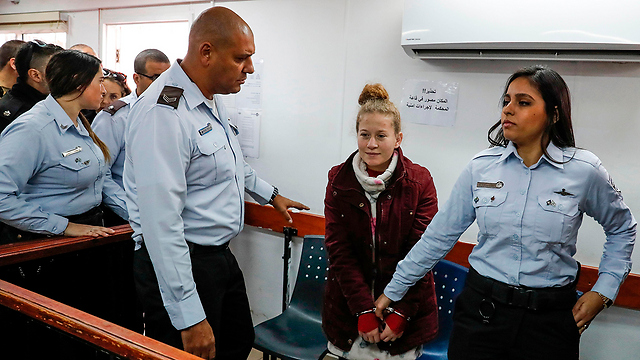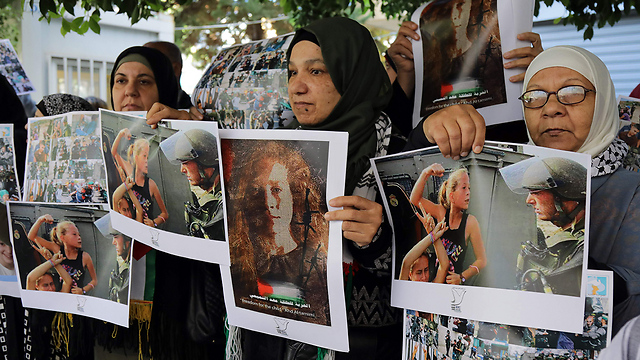
When one side’s bravery is another side’s humiliation
Op-ed: The Ahed Tamimi affair isn’t unusual, but the unusual attention it has received exposes the distortions of the occupation: The separate legal systems for Jews and Arabs in the territories, and the fact that a settler who kicked and cursed a police officer was sentenced to three months of community service, while the Palestinian girl will likely spend several months in prison.
I read the book as a child, and I admired the bravery of Menashe the Yemenite. I wasn’t the only one—so did every child in Israel.
I read the book again years later, and the operation lost some of its fame. I realized that bravery is sometimes relative, that one side’s bravery could be another side’s humiliation. In other words, if the book had been marketed in London, I’m not sure the act would have been received with much enthusiasm by British children as it was received by the Israeli children.
Which brings us to Ahed Tamimi and the emotional response she evoked on both sides of the Israeli street. Tamimi is a 17-year-old girl from Nabi Salih, a small village in the Ramallah Governorate. Despite her young age, she has a lot of experience fighting the occupation. During clashes with IDF soldiers in the village, she has a habit of provoking soldiers, shouting at them, pelting them with stones and kicking them. Each of her activities has been documented and distributed on Arab television channels and social media.
There is something else that sets her apart from other Palestinian children: She’s blonde. The blonde hair elevates her fame.
Last week, the Military Advocate General filed an indictment against Tamimi, focusing on the December 15 incident. She was filmed slapping a company commander and kicking him and another soldier. The incitement mentions five other incidents. The Military Advocate General asked the court once again to extend her remand. It’s standard procedure. The court agreed.
In the Arab world, and particularly on the Palestinian street, Tamimi’s behavior was received with great enthusiasm. Glorification songs were composed for her, she received marriage proposals, and her father’s work was praised (https://www.ynetnews.com/articles/0,7340,L-5062490,00.html). That’s understandable. We would likely react the same way if we were Palestinians. We would admire Tamimi just like we admired the children of Hasamba and rejoice at the occupation army’s downfall just like we rejoiced at Officer Thompson’s downfall.
But we aren’t Palestinians. I mean, most of us aren’t. The enthusiasm among some left-wing Israelis in light of the Nabi Salih girl’s actions was somewhat pathetic. One person compared her to Joan of Arc, the leader of the French revolt against the English during the Hundred Years' War, while someone else compared her to Hannah Szenes—two women who sacrificed their lives for their people. The comparison they made is not just an insult to the memory of Hannah Szenes, it’s an insult to history.
On the other hand, there are Israelis who wondered why the Givati soldiers failed to shoot the girl, her cousin and her mother on the spot. Not because there was an operational justification to do so, not because the circumstances matched the rules of engagement, but simply to avenge their bruised pride. That’s a dangerous state of mind. Even Defense Minister Avigdor Lieberman, who raises the death penalty banner, understands that.

The Tamimi affair should have been concluded in a matter of days. Everything in it is documented; everything is clear. Arrest, indict, quickly complete the Military Court discussion and let the judges decide. The Military Advocate General understood that: An indictment was filed as soon as the police investigation was completed. But then then the defense counsel, Gaby Lasky, asked for a week to prepare and then for another week. She has a right to do so. On Monday, Tamimi returned to the court for another remand extension.
The military courts in the territories have never been a model of justice. Often, too often, the evidence isn’t evidence, the witnesses aren’t witnesses, the punishment isn’t uniform. I once wrote, after attending several trials, that military justice is similar to justice like military music is similar to music. Ahed Tamimi isn’t innocent as a lamb, but she presents quite a difficult challenge to the system.
Her case isn’t unusual, but the unusual attention it has received exposes the distortions of the occupation. There are separate legal systems in the territories: The Arabs are prosecuted in military courts, the Jews in civil courts. Hebron resident Yifat Alkobi, who kicked and cursed a police officer, and—like Tamimi—has a long list of previous offenses, was sentenced to three months of community service. Tamimi will remain in custody until the end of legal proceedings, and will likely be sentenced to several months in prison. The discrimination is outrageous.
Tamimi can be a hero on social media, but in court she has to be judged for her actions. Just like Elor Azaria.











